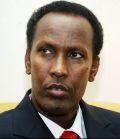Somali premier rules out relocation without peacekeepers
 NAIROBI, May 7 (AFP) — Somali Prime Minister Ali Mohammed Gedi on Saturday ruled out relocating his government currently exiled in Kenya to his country until regional peacekeepers are deployed in Mogadishu to help restore stability.
NAIROBI, May 7 (AFP) — Somali Prime Minister Ali Mohammed Gedi on Saturday ruled out relocating his government currently exiled in Kenya to his country until regional peacekeepers are deployed in Mogadishu to help restore stability.
“It will not be useful to relocate the government there (Mogadishu) unless the stabilisation force by the African Union is deployed,” Gedi told reporters here on arrival from a seven-day first visit to Mogadishu since his appointment in December.
An explosion rocked a Mogadishu stadium from where Gedi was addressing thousands of Somalis Tuesday about plans to bring a government to the lawless country and reconcile rivals.
Diplomats said it was an attempt on his life although Gedi rejected the claims immediately after the blast that killed at least 15 people and wounded nearly 40 others.
“There was no attempt on my life, this was an accident and it has nothing to do with a pre-planned attack,” Gedi said on Saturday.
The prime minister, who visited several parts of the bullet-charred capital, said Mogadishu residents had shown a willingness to restore stability, despite widespread violence.
“The people have the will to pacify Mogadishu and it is an important and valuable asset of the peace process,” he said. “We have to take this opportunity for the relocation of the Somali government.”
In March, the regional seven-nation east African Inter-Governmental Authority on Development (IGAD) said the first deployment of two battalions of IGAD soldiers from Sudan and Uganda could be on the ground by the end of April.
IGAD is expected to eventually deploy as many as 10,000 troops to assist Somali President Abdullahi Yusuf Ahmed, Gedi and other transitional institutions to relocate from exile in Kenya to Somalia.
But up to now, the first batch of peacekeepers from Sudan and Uganda has not arrived, owing to logistical bottlenecks.
Precise details of the mission are yet to be released amid a bitter dispute over the composition of the force within the transitional Somali government.
Fierce opposition to the participation of neighboring countries Djibouti, Ethiopia and Kenya in the force prompted a bloody brawl in the Somali parliament, sitting in Nairobi, last month.
IGAD — which comprises Djibouti, Eritrea, Ethiopia, Kenya, Sudan, Uganda and nominally Somalia — has repeatedly announced that it would not let the Somali peace process collapse.
Somalia has been in chaos without any functioning central authority since the fall of strongman Mohamed Siad Barre in 1991 turned the nation into a patchwork of fiefdoms ruled by warlords.
